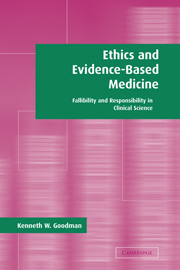Book contents
- Frontmatter
- Contents
- Preface
- Acknowledgments
- 1 Foundations and history of evidence-based practice
- 2 The research synthesis revolution
- 3 Evidence of evidence, and other conceptual challenges
- 4 Human subjects, the Internet, databases, and data mining
- 5 Evidence at the bedside
- 6 Public health policy, Uncertainty, and genetics
- 7 Ethics and evidence
- References
- Index
1 - Foundations and history of evidence-based practice
Published online by Cambridge University Press: 29 September 2009
- Frontmatter
- Contents
- Preface
- Acknowledgments
- 1 Foundations and history of evidence-based practice
- 2 The research synthesis revolution
- 3 Evidence of evidence, and other conceptual challenges
- 4 Human subjects, the Internet, databases, and data mining
- 5 Evidence at the bedside
- 6 Public health policy, Uncertainty, and genetics
- 7 Ethics and evidence
- References
- Index
Summary
It isn't what we don't know that gives us trouble, it's what we know that ain't so.
Will RogersThis chapter will locate systematic science and evidence-based medicine against the background of biomedical research in the second half of the twentieth century. The growth of this research paralleled and in some ways forced the evolution of current standards for communicating the results of scientific inquiry (i.e., the emergence of peer review and the expansion of the number of research programs, journals, books, etc.). The research raises interesting issues about the role and nature of expertise and medical knowledge, and it has led to a vast tableau of practice guidelines, critical pathways, consensus statements, and assorted other scientifically based imperatives for the care of individual patients. These imperatives are increasingly linked to physician and institution reimbursement. Where the stakes are highest, as in clinical medicine and public health, these forces assume special importance for ethics and public policy.
Before it became a movement, or a cause, evidence-based medicine (EBM) was a kind of cognitive itch: a troublesome doubt that follows from the realizations that humans are fallible, that scientific knowledge increases and that medical decisions sometimes have very high stakes. If you make a mistake, your patient might die. Less ominous, even if they do not die, patients are often paying for physicians' services, either through taxes or by putting cash on the barrel in one way or another.
- Type
- Chapter
- Information
- Ethics and Evidence-Based MedicineFallibility and Responsibility in Clinical Science, pp. 1 - 22Publisher: Cambridge University PressPrint publication year: 2002



